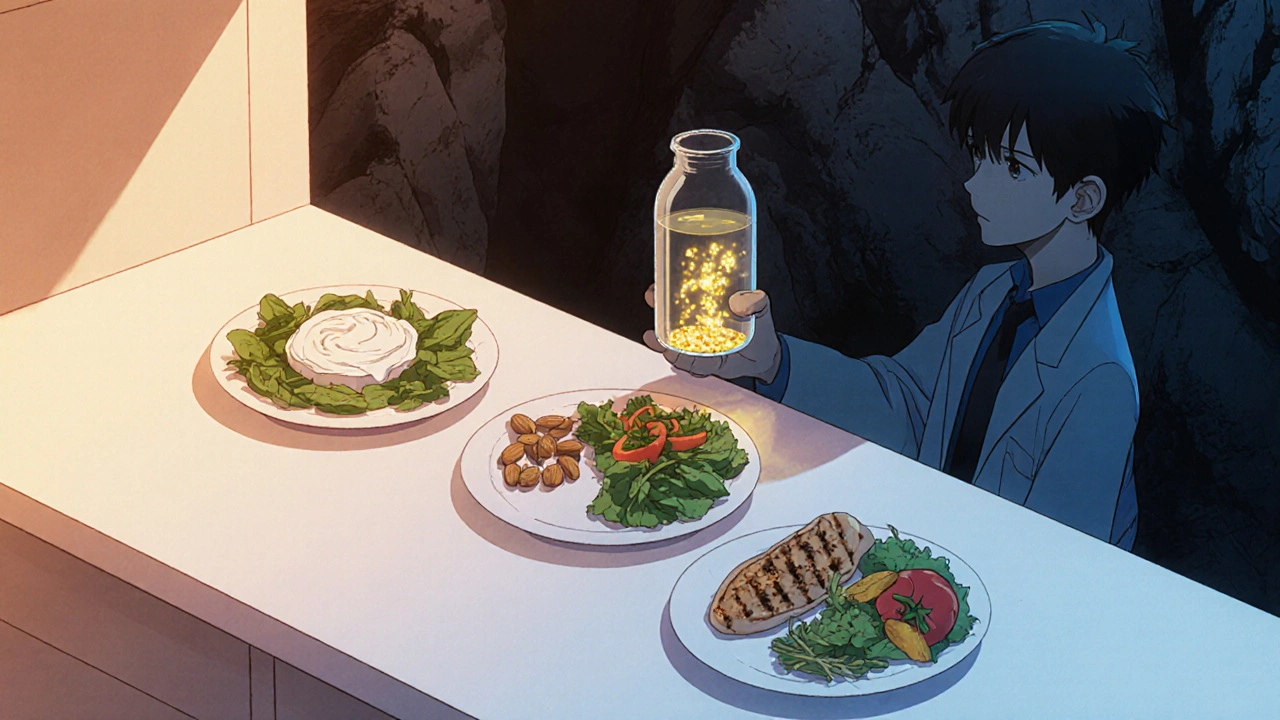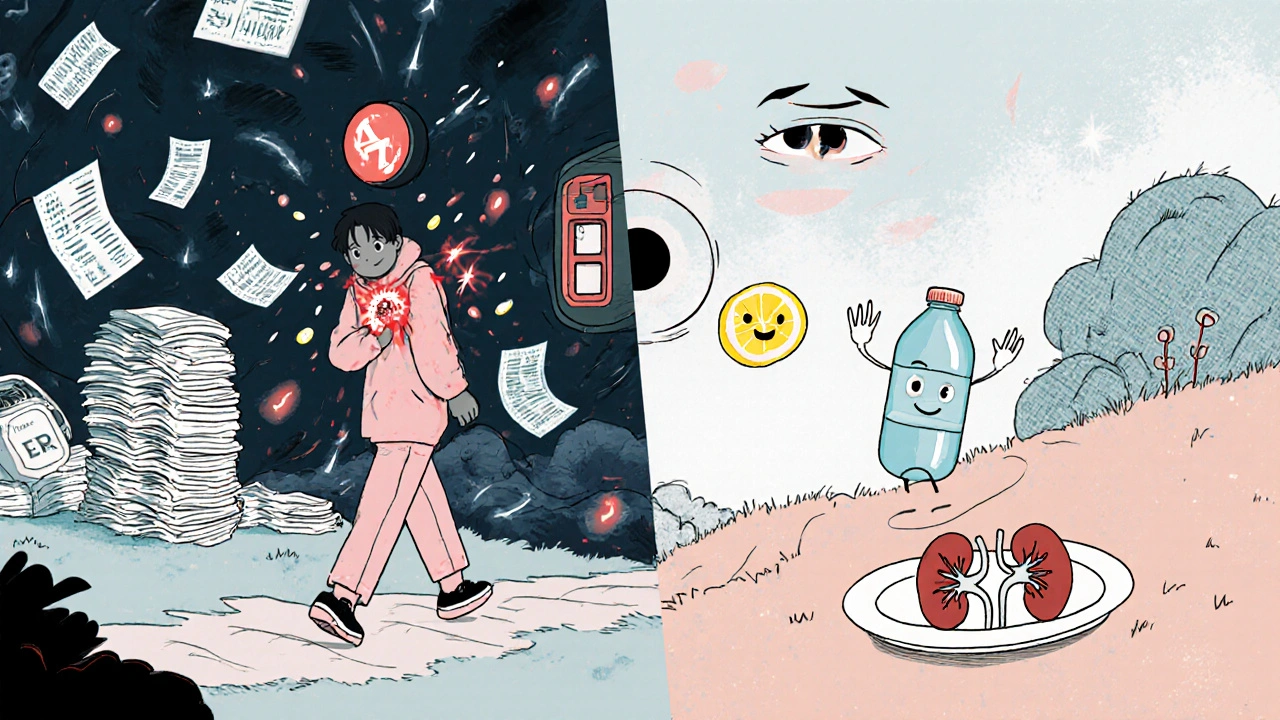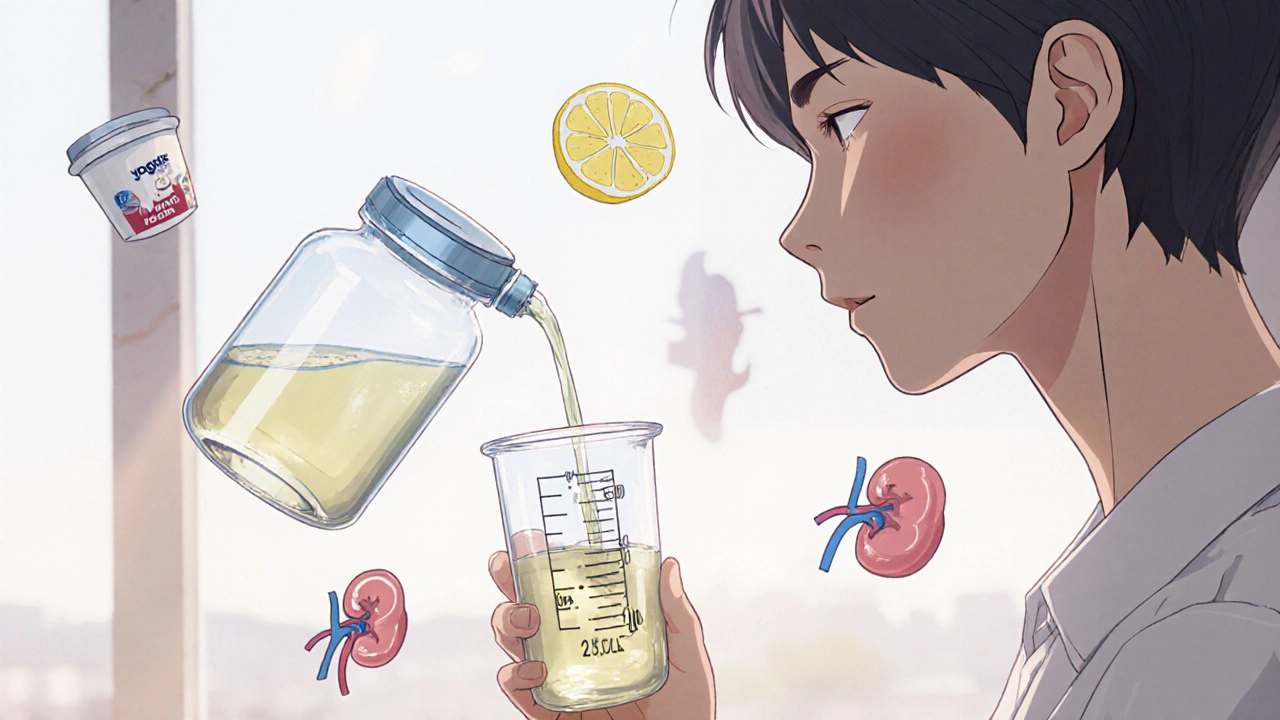If you’ve had one kidney stone, you’re not done with them. About 30% to 50% of people who pass a stone will have another within just three to five years. And if you don’t change anything? That number jumps to 70% in five years. This isn’t a one-time problem. It’s a chronic condition - like high blood pressure or diabetes - that needs daily attention. The good news? You can cut your risk dramatically. Not with magic pills, but with simple, consistent habits around what you drink and eat.
Drink More Than You Think You Need
Fluid intake isn’t just important - it’s the single most powerful tool you have. The goal isn’t to feel thirsty. It’s to produce at least 2.5 liters of urine per day. That means drinking 2.5 to 3 liters of fluid daily - even more if it’s hot, you’re exercising, or you’re sweating. Most people guess wrong. They think, ‘I had two glasses of water today, that’s enough.’ It’s not.
Thirst is a late signal. By the time you feel it, you’re already dehydrated. Your urine should be pale yellow, almost clear. Dark yellow? You’re behind. Use a marked water bottle. Track it. Fill it twice a day. Drink one glass with every meal, one between meals, one before bed. Don’t wait.
Water is best. But tea, coffee, and even soda (in moderation) count toward your total. The idea that caffeine dehydrates you is outdated. Studies show moderate caffeine intake doesn’t hurt your hydration. The real problem? Fizzy drinks, especially colas. They contain phosphoric acid and high-fructose corn syrup, both linked to higher stone risk. Skip them. Stick to water, herbal tea, or lemon water.
Don’t Cut Out Calcium - Add It
This is the biggest mistake people make. You hear ‘oxalate causes stones,’ so you avoid spinach, nuts, and chocolate. Then you cut out dairy, thinking less calcium means fewer stones. Wrong. Cutting calcium actually makes stones more likely.
Here’s why: calcium in your gut binds to oxalate from food. That bound oxalate gets flushed out in stool - not absorbed into your blood or urine. If you don’t eat enough calcium, oxalate floats freely, gets absorbed, and ends up in your kidneys - where it teams up with calcium to form stones. So eat calcium-rich foods with your meals.
Three servings a day of milk, yogurt, cheese, or fortified plant milk is ideal. A cup of yogurt at breakfast, a slice of cheese with lunch, a glass of milk with dinner. Don’t rely on supplements unless your doctor says so. Food calcium works better and is safer.
Watch Your Salt - It’s Everywhere
Sodium is the silent stone-maker. It makes your kidneys dump more calcium into your urine. The target? 2 grams of sodium per day. That’s 5 grams of salt - less than a teaspoon. But here’s the catch: 75% of sodium comes from processed and packaged foods. Not the salt shaker.
Check labels. Bread, canned soup, deli meats, frozen meals, soy sauce, even breakfast cereals - they’re loaded. Choose low-sodium versions. Cook more at home. Rinse canned beans. Skip the salt when boiling pasta. Taste before you season. Your kidneys will thank you.
Limit Animal Protein - But Don’t Eliminate It
Too much meat, poultry, fish, or eggs increases uric acid and reduces citrate - both bad for stones. The limit? 8 ounces per day. That’s about the size of two decks of cards. Spread it out. One chicken breast at lunch, a small fish fillet at dinner. Skip the steak dinners three times a week.
Plant proteins - beans, lentils, tofu, tempeh - are your friends. They’re lower in purines and don’t acidify your urine. You don’t need to go vegan, but swapping out even one meat meal a day helps.

Don’t Fear Oxalate - Pair It Right
Oxalate-rich foods like spinach, beets, nuts, chocolate, and tea can contribute to stones - but only if eaten without calcium. The trick isn’t avoidance. It’s pairing.
Eat your spinach with yogurt. Have almonds with a glass of milk. Have dark chocolate as a dessert, not a snack. The calcium in your meal binds the oxalate in your gut before it reaches your kidneys. You can still enjoy these foods. Just don’t eat them alone.
Try Lemon Juice - It’s Simple
One easy win? Add fresh lemon juice to your water. Two to three lemons’ worth of juice daily (about 4-6 tablespoons) can boost citrate levels in your urine. Citrate is a natural stone blocker. It stops calcium from clumping with oxalate or phosphate.
It’s not a cure. But studies show it helps. And it’s free. Squeeze it into your water bottle. Use a reusable lemon squeezer. Make it part of your routine - like brushing your teeth.
Follow-Up Testing Isn’t Optional
After your first stone, your doctor should order a 24-hour urine test. It’s not a luxury. It’s essential. This test shows what’s in your urine - calcium, oxalate, citrate, sodium, pH - and tells you exactly what’s driving your stones.
Most stones are calcium oxalate (80%), but some are uric acid, struvite, or cystine. Each needs a different plan. Without testing, you’re guessing. And guessing wastes time and increases risk.
After you start your diet and fluid plan, get tested again in 8 to 12 weeks. Did your citrate go up? Did your sodium drop? Did your urine volume hit 2.5 liters? Adjust based on results. This isn’t a one-time fix. It’s a long-term management plan.

What About Medications?
Some people need pills - like thiazide diuretics to lower urine calcium, or potassium citrate to raise citrate. But not everyone does. And not all meds work the same for everyone.
A recent trial found hydrochlorothiazide didn’t perform much better than placebo in some groups. That doesn’t mean it doesn’t work - it means you need the right drug for your type of stone. That’s why testing matters. Never start or stop a medication without talking to your doctor.
The Bigger Picture: Stones and Kidney Health
Recurrent stones aren’t just painful. They’re linked to chronic kidney disease. About 19% of people who keep getting stones develop long-term kidney damage. That’s why prevention isn’t just about avoiding the next episode. It’s about protecting your kidneys for life.
The DASH diet - originally designed for high blood pressure - is now recommended for stone prevention. It’s rich in fruits, vegetables, whole grains, and low-fat dairy, and low in salt and red meat. Studies show it cuts stone risk by 40-50%. It’s not a fad. It’s a lifestyle.
What Happens If You Don’t Change?
One stone? Painful, but manageable. Two stones? You’re in the 35% group. Five stones? You’re in the 52% group - the ones who keep coming back, year after year. Each episode costs $1,500 to $2,500 in emergency care. Surgery? Up to $10,000.
And the pain? It doesn’t get easier. It gets worse. Your kidneys take a beating. Your life gets interrupted. Work, travel, sleep - all disrupted.
You don’t have to live like that.
Start Today - No Perfection Needed
You don’t need to overhaul your life overnight. Pick one thing. Drink an extra glass of water with lunch. Swap your afternoon soda for lemon water. Add yogurt to your breakfast. That’s it. Do that for a week. Then add another.
Track your urine color. Use a water bottle. Read labels. Eat calcium with oxalate foods. Cut the salt. These aren’t hard rules. They’re habits. And habits, done consistently, change outcomes.
Kidney stones are chronic. But so is your power to prevent them. You’ve already survived one. Now you can stop the next one - and the one after that.
Can drinking lemon water really prevent kidney stones?
Yes. Lemon juice contains citrate, which binds to calcium in urine and stops it from forming crystals with oxalate or phosphate. Adding 4-6 tablespoons of fresh lemon juice daily (about 2-3 lemons) can raise urinary citrate levels enough to reduce stone risk. It’s not a replacement for other measures, but it’s a simple, low-cost addition that works for many people.
Should I avoid spinach and nuts if I have kidney stones?
No - not if you eat them with calcium. Spinach and almonds are high in oxalate, but when eaten with dairy or calcium-rich foods, the calcium binds to oxalate in your gut and prevents it from reaching your kidneys. Eat your spinach with cheese or have nuts with yogurt. Avoiding these foods entirely isn’t necessary and can hurt your overall nutrition.
Is it true that cutting calcium helps prevent kidney stones?
No. Cutting calcium increases your risk. Your body absorbs more oxalate when you don’t get enough calcium from food. That oxalate ends up in your urine and combines with calcium there - forming stones. Aim for 3 servings of calcium-rich foods daily from sources like milk, yogurt, cheese, or fortified plant milk. Supplements aren’t as effective and can sometimes increase risk.
How much water should I drink every day to prevent kidney stones?
Drink enough to produce at least 2.5 liters of urine per day. That usually means 2.5 to 3 liters of total fluid intake - more if you’re hot, active, or sweating. Water is best, but tea, coffee, and broth count. Dark yellow urine means you’re not drinking enough. Aim for pale yellow or clear.
Do I need to get a 24-hour urine test after my first kidney stone?
Yes. This test measures what’s in your urine - calcium, oxalate, citrate, sodium, and pH. It tells you exactly why you formed stones and what to fix. Most people don’t get tested, but without it, you’re guessing. After starting dietary changes, get retested in 8-12 weeks to see if your plan is working.
Can fizzy drinks cause kidney stones?
Yes - especially colas. They contain phosphoric acid and high-fructose corn syrup, both linked to higher stone risk. Phosphoric acid acidifies urine, and fructose increases calcium and oxalate in urine. Other fizzy drinks like lemon-lime sodas are better than colas but still contain sugar. Water, tea, or lemon water are safer choices.
Is the DASH diet helpful for preventing kidney stones?
Yes. The DASH diet - high in fruits, vegetables, whole grains, and low-fat dairy, low in salt and red meat - reduces kidney stone risk by 40-50%. It naturally lowers sodium, increases citrate, and improves overall kidney health. It’s not just for blood pressure. It’s one of the best evidence-based diets for stone prevention.
Can kidney stones cause permanent kidney damage?
Yes. Recurrent stones can lead to chronic kidney disease. About 19% of people who keep forming stones develop long-term kidney damage. Each stone episode can cause scarring, inflammation, or infection. Preventing stones isn’t just about avoiding pain - it’s about protecting your kidney function for life.


Graham Holborn
Hi, I'm Caspian Osterholm, a pharmaceutical expert with a passion for writing about medication and diseases. Through years of experience in the industry, I've developed a comprehensive understanding of various medications and their impact on health. I enjoy researching and sharing my knowledge with others, aiming to inform and educate people on the importance of pharmaceuticals in managing and treating different health conditions. My ultimate goal is to help people make informed decisions about their health and well-being.